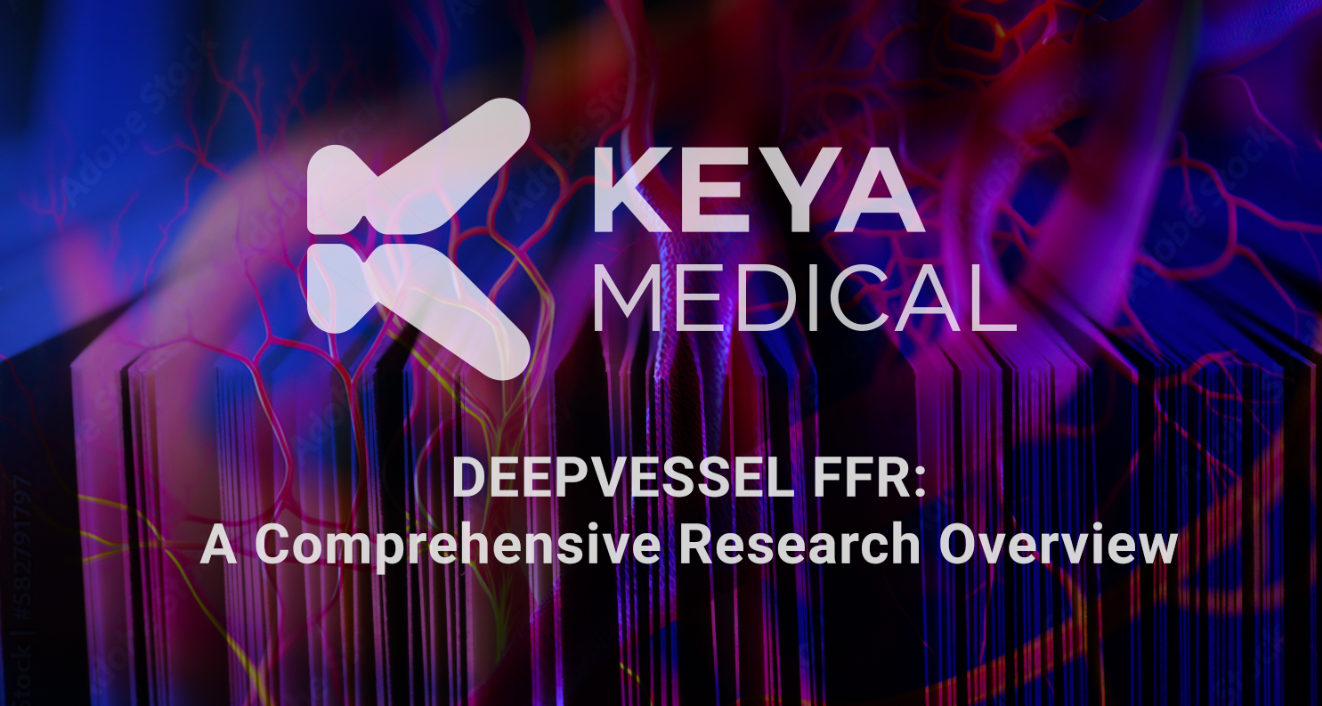
This blog is a journey through the latest frontiers in cardiac care, centering on Keya Medical’s research and peer-reviewed publications. Our focus is on the advancements enabled by AI-based CT-FFR analysis, with a spotlight on Keya Medical’s DEEPVESSEL FFR. Our innovative AI-based CT FFR technology, backed by FDA clearance, CE mark, and NMPA approval, has ignited considerable interest among physicians, payors, medical software buyers, and distributors alike.
Validation of Clinical Performance:
The cornerstone of DEEPVESSEL FFR’s credibility lies in the ADAPT Study (Assessment of the Diagnostic Performance of DeepVessel FFR in Suspected Coronary Artery Disease). Published in 2021, this study served as the foundation for FDA clearance, solidifying DEEPVESSEL FFR as the second augmentative software for non-invasive FFR analysis in the USA, following HeartFlow® FFRct Analysis.
The ADAPT Study: Assessment of the DiAgnostic Performance of DeepVessel FFR in SuspecTed Coronary Artery Disease (ADAPT)
Patient Management Enhancement:
DEEPVESSEL FFR improves patient management strategies for stable CAD by:
- Reducing unnecessary invasive procedures through precise identification of patients with unimpaired coronary blood flow (FFR > 0.8).
A 2-year Investigation of the Impact of the Computed Tomography-derived Fractional Flow Reserve Calculated Using a Deep Learning Algorithm on Routine Decision-making for Coronary Artery Disease Management - Improving the accuracy of subsequent revascularization decisions with a CT-first approach, as demonstrated in the TARGET Randomized Trial.
On-Site Computed Tomography–Derived Fractional Flow Reserve to Guide Management of Patients With Stable Coronary Artery Disease: The TARGET Randomized Trial. - Refining treatment approaches for functional ischemia and severe calcifications, thus optimizing patient outcomes.
Impact of coronary computed tomography angiography-derived fractional flow reserve based on deep learning on clinical management.
CT FFR and Plaque Analysis:
Integrating CT FFR analysis with plaque features enables:
- The amalgamation of CT FFR analysis with plaque features holds promise in predicting the risk of Acute Coronary Syndrome (ACS), as elucidated in studies focusing on risk prediction models.
Risk predicting for acute coronary syndrome based on machine learning model with kinetic plaque features from serial coronary computed tomography angiography. - Explorations into the clinical value of the Perivascular Fat Attenuation Index (FAI) and CT-FFR in identifying culprit lesions leading to subsequent ACS underscore its potential in preventive cardiology.
Clinical value of perivascular fat attenuation index and computed tomography derived fractional flow reserve in identification of culprit lesion of subsequent acute coronary syndrome. - Studies investigating the incremental diagnostic value of FAI in identifying hemodynamically significant ischemia in severely calcified vessels provide insights into its clinical utility.
Incremental diagnostic value of perivascular fat attenuation index for identifying hemodynamically significant ischemia with severe calcification.
Innovations in Diagnostics:
-
- Investigating the impact of TAVI on FFR CT values underscores the utility of CT-FFR in guiding post-procedural management decisions.
Variation of computed tomographic angiography–based fractional flow reserve after transcatheter aortic valve implantation. - Exploring the feasibility of CT FFR in patients with RMS highlights its versatility across various cardiac interventions.
Coronary Computed Tomography Angiography for the Assessment of Sirolimus-Eluting Resorbable Magnesium Scaffold. - Examining the role of CT-derived FFR in distinguishing AMI from UA underscores the diagnostic prowess of this technology.
Value of CT‑derived fractional flow reserve in identifying patients with acute myocardial infarction based on coronary computed tomography angiography.
- Investigating the impact of TAVI on FFR CT values underscores the utility of CT-FFR in guiding post-procedural management decisions.
Effect of Advanced CT Technology:
Integrating 320-row CT reconstruction technology enhances the stability and performance of AI-based CT-FFR analysis, paving the way for more accurate diagnostic assessments.
- Effect of 320-row CT reconstruction technology on fractional flow reserve derived from coronary CT angiography based on machine learning: single- versus multiple-cardiac periodic images.
- Effect of 320-Row Computed Tomography Acquisition Technology on Coronary Computed Tomography Angiography–Derived Fractional Flow Reserve Based on Machine Learning: Systolic and Diastolic Scan Acquisition.
The adoption of AI-based CT FFR analysis signifies a paradigm shift in CAD diagnosis and patient management. With validation through studies like the ADAPT Study and an extensive body of research exploring its clinical applications, DEEPVESSEL FFR emerges as a pivotal tool in the armamentarium of modern cardiac care. As stakeholders in the healthcare ecosystem, leveraging these advancements promises not only enhanced patient outcomes but also optimized resource allocation and cost-effectiveness. Through continued research and adoption, AI-based CT FFR analysis is redefining the landscape of cardiovascular medicine, empowering clinicians in their pursuit of precision and efficacy.
About Keya Medical
Keya Medical is an international medical technology company developing deep learning-based medical devices for disease diagnosis and treatment. The company is committed to creating solutions that deliver clinical value at all stages in the patient care process, covering specialties including cardiology, neurology, pulmonology, pathology, and surgery. Keya Medical has four centers of excellence in Beijing, Shanghai, Shenzhen, and Seattle. Follow us on LinkedIn, Twitter, and Facebook.
Media Contact
contact@keyamedna.com
Learn more about DEEPVESSEL FFR
We are actively looking for clinical partners in the United States and EMEA.
